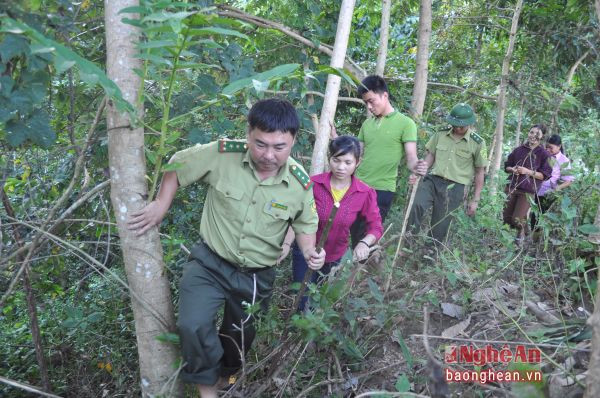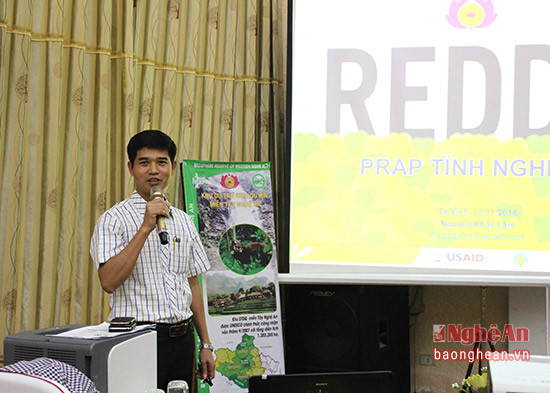Contribute to the implementation of the policy of payment for forest environmental services
(Baonghean) - Payment for forest environmental services under Decision 99 of the Government is an unprecedented new policy. The implementation process encountered many difficulties and complications, but with the active participation of forest rangers, the policy soon came into life, contributing to creating a new step in forest management and protection in mountainous districts.
Payment for forest environmental services is a policy that has been implemented since 2012, but has only been applied to areas managed by state forest owners. Since 2015, according to the Decision of the Provincial People's Committee, the forest rangers: Que Phong, Tuong Duong, Ky Son, Quy Chau, Quy Hop, Con Cuong - units with forest areas located in the basins of hydropower plants have been assigned to be the focal point for payment of forest environmental services to forest owners other than state forest owners.
During the implementation process, many difficulties and challenges were faced. The most complicated of which was that many forest areas were under common ownership (of the commune), the majority of households allocated forestry land under Decree 163 had small areas, and the payment unit prices were not uniform (some hydropower plants paid 400,000 VND/ha, but some hydropower plants only paid 180,000 - 190,000 VND/ha). On the other hand, people's awareness of forestry law was limited, their lives mainly depended on forests; the forest areas paid were production forests mainly located on the riverbank, near traffic routes, and residential areas, causing great pressure on management and protection work...
But realizing the great significance of the policy as a driving force and lever to bring good results in forest protection and management, the leaders of the districts have struggled to find and propose flexible and effective implementation methods. In addition to hiring consultants to prepare technical design documents, the districts have assigned local forest rangers to advise the government to do a good job of disseminating Decree 99 of the Government on the Policy on Payment for Forest Environmental Services; reviewing and making statistics on the current status of forests and the subjects of contracts. In particular, the work of contracting, accepting and paying for forest protection has been paid great attention by the districts and organized quite closely.
 |
| Forest rangers of Que Phong district coordinate with people of Dong Van commune to patrol and protect the forest. |
Specifically, based on the reality and conditions of each basin area, the districts choose the subjects to be households, groups of households or village community households to sign the contract. However, when paying, there must be an acceptance and assessment of specific results and the money must be paid publicly and directly to the contracting subjects according to the unit price of the forest area assigned. For example, in Que Phong, the 4 basins of the 4 hydropower plants have their own characteristics, so the 4 basins have 3 different contracting methods. In the Cua Dat - Hua Na hydropower basin, the same conditions are implemented according to 3 groups of subjects (groups of households, community households and commune forest protection teams); Sao Va hydropower basin implements the signing of contracts according to 4 types of contracting subjects: Groups of households with land assigned according to Decree 163/CP, groups of households with temporary land assignment, village community households, commune forest protection teams.
According to Mr. Tran Duc Loi - Deputy Head of the District Forest Ranger Department - who is directly in charge of the district's forest environmental service payment policy, "This flexible contracting method has many outstanding advantages. It is not against the principles but also achieves the required goal of mobilizing the best force to participate in forest protection."
Through research, it is found that: If we sign a contract for forest land allocation with households, it seems good but it is very difficult to implement. Because most households are allocated forest land according to Decree 163 with small areas, if we sign a contract directly with each household, it will be inconvenient in arranging labor to patrol and protect the forest. On the contrary, a contract with a group of households will promote democracy, community spirit, and mobilize human resources to participate in forest protection more conveniently. Because through a group of households or a community household, the role of village elders, prestigious people is promoted, the arrangement and assignment of people to take turns patrolling and protecting the forest will be easier, helping forest management and protection to achieve high results. The payment of the contract money is carried out strictly by the division. Before payment, the division organizes a delegation of representatives of the commune, village and district authorities to inspect the contracted forest area. When paying, there is a notice in advance for the contracted households to come and receive it and invite the Provincial Forest Protection and Development Fund to supervise.
With a creative and transparent approach, in 2015, 6 districts assigned to implement the policy of payment for forest environmental services organized the signing of contracts with hundreds of household groups representing thousands of families to participate in contracting and protecting the safety of over 91,000 hectares of forest in the basins of hydropower plants: Ban Ve, Khe Bo, Nam Non (Tuong Duong), Cua Dat (Thanh Hoa), Hua Na, Ban Coc, Sao Va (Que Phong), Ca Loi, Nam Mo - Nam Can (Ky Son).
The districts have paid 22,273.8 million VND to the contracted subjects, creating conditions for people to improve their lives. Many forest ranger districts have made large payments with high results. Typically, in 2015, Tuong Duong Forest Ranger District paid over 16.2 billion VND to the subjects in a timely and complete manner, attracting 374 household groups and 5,296 households to participate in protecting nearly 67,000 hectares of safe forest. Que Phong Forest Ranger District has organized the signing of contracts with 89 household groups, 39 community households, 7 teams, implementing the policy of paying for forest environmental services for production forest land in 5 communes and the payment amount of 6.312 billion VND, more than 19,000 hectares of forest in 4 hydropower basins in the contracted district have been strictly protected and safe.
 |
| Forest protection fund leaders present plans to reduce emissions and degradation from forests. Photo CL |
After more than 1 year of implementing the policy of payment for forest environmental services in the area by the forest rangers, it has brought about encouraging results in terms of environment, economy and social effects. It is easy to see that people have benefited from the policy of creating conditions to increase income and improve their lives. In addition to the payment amount of 200,000 - 400,000 VND/ha/year, households can also collect secondary forest products (bamboo shoots, bamboo, bamboo, medicinal herbs) with an income of 5 - 10 million VND to improve their lives. The policy has a profound meaning and has impacted on changing the awareness and behavior of forest owners, especially family forest owners of ethnic minorities.
Surveying some areas such as Dong Van (Que Phong), the policy also contributes to promoting the socialization of forestry, actively contributing to reducing the poverty rate, ensuring social security, and ensuring the livelihoods of those working in forestry. In addition, the implementation of the forest environmental service payment policy has really brought the forest rangers closer to the government and the villagers, especially creating favorable conditions for the districts to grasp the situation and advise on solutions for forest protection and management, promptly preventing illegal exploitation of forest products and forest fires. Thereby helping the industry to build an increasingly strong and comprehensive forest rangers force, performing well the assigned tasks, contributing to the work of protecting and developing forests in a sustainable direction.
From that result, in 2016, the policy of paying for forest environmental services undertaken by the districts was expanded by 49,000 hectares, bringing the total implemented area to more than 141,000 hectares./.
Hai Yen
